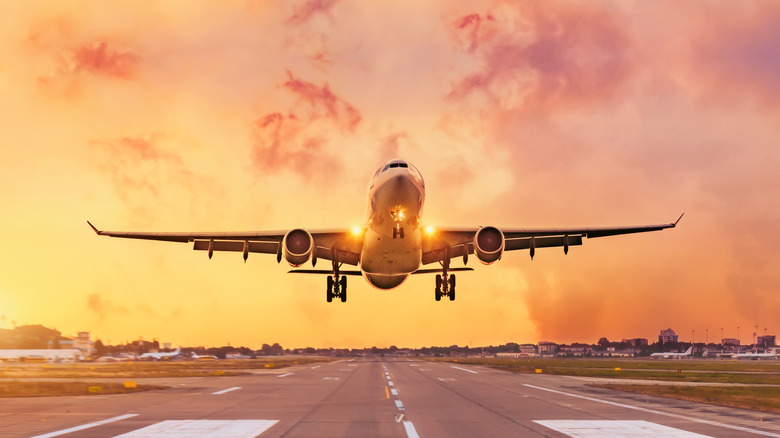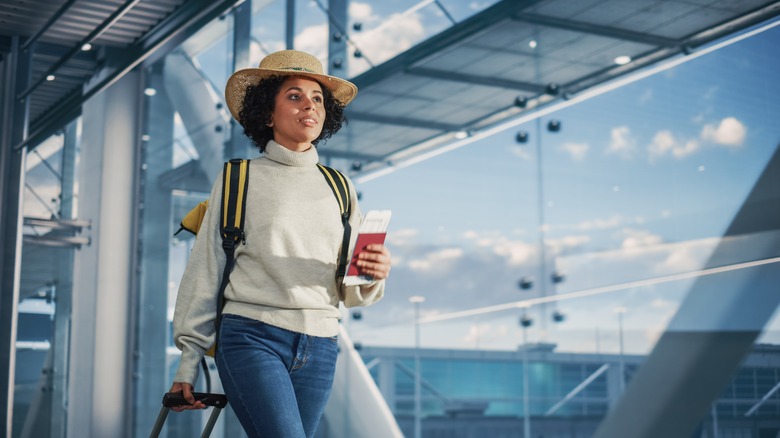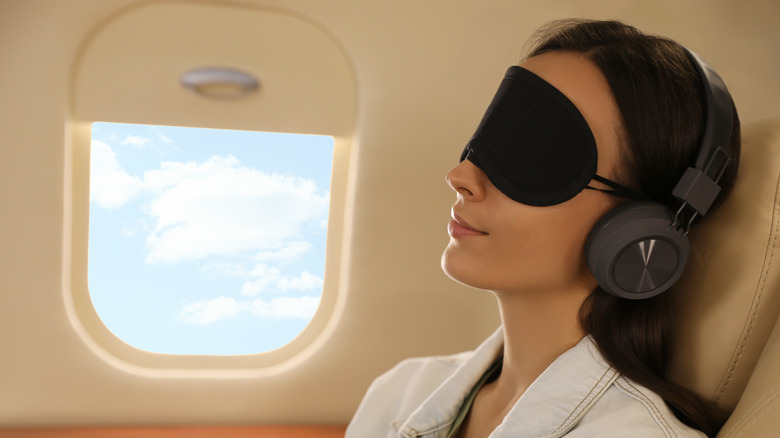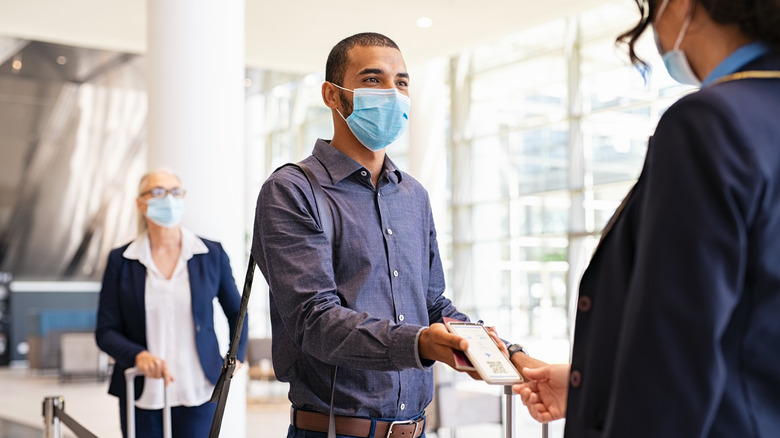Jet Lag Explained: Causes, Symptoms, And Treatments
If you've traveled by air across the country or across the globe, you've likely experienced jet lag. Crossing several time zones in a short period of time disrupts your internal body clock, which can cause a host of uncomfortable symptoms. These may include fatigue, insomnia, mood changes, and digestive upset (via Sleep Foundation). As if long-distance travel isn't uncomfortable and exhausting enough.
Occasional jet lag isn't serious, but it can affect how you feel, and it can make the first few days of your trip less enjoyable. If you're traveling for work or competition, it can also affect your performance. If you're a frequent long-distance traveler, some research has shown that chronic jet lag could have long-term health consequences (via Aging).
There isn't a cure for jet lag (via Cleveland Clinic). Like the common cold, you just have to wait it out. But there are things you can do to help speed up your body's adjustment to a new time zone. There are also steps you can take pre-travel to minimize jet lag's effects.
Causes of jet lag
Your body has an internal clock, otherwise known as your circadian rhythm, according to the Sleep Foundation. This 24-hour clock is synced with daylight and regulates your sleep-wake schedule, telling your body when it's time to be alert and when it's time to go to bed. When you skip time zones, gaining or losing hours in the day, your schedule is disrupted and your body has to adjust to a new sleep-wake cycle. This adjustment period, and the accompanying side effects, is known as jet lag.
Jet lag is more likely to happen when you travel across three or more time zones. For example, if you travel from Dallas, Texas, to Atlanta, Georgia, that's one time zone, or a one-hour time difference. You will lose one hour, and your internal clock will think it's earlier than it actually is when you arrive at your destination. That's not going to make a big difference in your sleep-wake cycle. But if you go from Dallas to Paris, France, you're skipping ahead seven hours. If, for instance, it's 11:30 p.m. in Paris, it's only 4.30 p.m. at home in Dallas — so while it's time to go to bed at your destination, you may not feel sleepy at all. However, when you wake up the next morning at 8 a.m. in Paris, it's only 1:30 a.m. in Dallas, and your body still thinks it's the middle of the night. It can take the body several days to adjust to its new environment.
Other factors affecting jet lag
Time difference is the main cause of jet lag (via Sleep Foundation), but there are other contributing factors. Individual physiology and how sensitive your body is to change can influence how you experience jet lag (via Circadian Rhythm). The time of day at which you make your voyage can also make a difference. If you take an overnight flight and you're not able to sleep well on the plane, you're going to feel much worse when you arrive at your destination in bright sunlight the next morning (via The Washington Post).
According to an article in Sleep Medicine Clinics, jet lag tends to worsen with age. The body becomes less "phase-tolerant," and older people will suffer more from circadian misalignment than younger people. In addition, the amount and quality of sleep you had before your trip can make jet lag better or worse. If you were already in a sleep debt, or you were getting poor-quality sleep, jet lag's likely going to have a bigger impact.
Several other things can contribute to jet lag, including extended periods sitting on a plane, low oxygen and air pressure in the cabin, and dehydration from the typically dry, warm air circulating inside airplanes (via Cleveland Clinic).
Common jet lag symptoms
Each individual will experience jet lag differently, but some common symptoms include general fatigue, abnormal daytime sleepiness, insomnia or somnolence, impaired cognitive function, irritability or other mood changes, and headaches (via OHSU Brain Institute). Gastrointestinal problems such as stomach cramps, diarrhea, and constipation are also common, and you may experience changes in appetite (via National Health Service).
There's also a chance that jet lag could exacerbate pre-existing physical or mental health conditions. If you already suffer from a sleep disorder, or if you have irritable-bowel syndrome (IBS), the sleep interruptions and gastrointestinal complications common with jet lag can make these things worse (via Florida Dental Sleep Disorders and Hawaii Gastroenterology Specialists). Mental health conditions such as anxiety and depression can also be negatively affected by jet lag. According to a 2020 research review in Translational Psychiatry, there is a strong association between circadian rhythms and mental health. Disruption of the sleep-wake cycle caused by jet lag or night shift work, in addition to nighttime exposure to artificial light, can cause or worsen mental health conditions.
How long does jet lag last?
Just as there isn't any one-size-fits-all answer to what symptoms you can expect or how they will affect you, there's also no single answer to how long jet lag will last. It depends on a variety of factors, including what you do in the days leading up to travel and once you get off the plane. It could be a few days to a few weeks. The general guideline, however, is that the farther you travel, the longer jet lag will stick around. This makes sense since the more time zones you cross, the more your sleep schedule is impacted. According to the Mayo Clinic, it typically takes one day per time zone crossed to recover. So if you've crossed seven time zones, you can expect to be feeling better within a week.
Jet lag may subside faster if you travel from west to east, according to a 2011 research review in Pharmacy and Therapeutics. Jet lag from eastward travel, in which you lose hours of the day, typically lasts longer than jet lag from westward travel, in which you gain hours.
How jet lag affects performance
Jet lag is no fun, no matter what your reason is for travel. But if your vacation plans include sleeping in and lying on the beach all day, you'll have some recuperation time built in. However, if you're traveling for business, sports, or anything else for which you have to perform at a high level, jet lag can make it very difficult to be at your best
For athletes, whether traveling to compete or returning home to compete, jet leg has a marked affect on performance. A 2017 study in PNAS examined 20 years of Major League Baseball statistics to see what effect, if any, jet lag had on players. After looking at over 40,000 games and nearly 5,000 times when players had to travel through two or more time zones, the researchers found that, on average, jet-lagged players performed worse than non-jet-lagged players. Eastward travel had a greater impact on performance than westward travel, and it didn't matter if the players were traveling to compete as the "away" team, or returning home to compete. If there wasn't enough time to adjust their sleep schedules, the players were at a disadvantage.
How to treat jet lag
Unfortunately there's no cure for jet lag, and it's nearly inevitable that you will suffer some symptoms with long-distance travel. But there are some tried-and-true methods to help alleviate some of your suffering. The Cleveland Clinic suggests adopting the sleep-wake schedule at your destination as soon as possible. Although it may be tempting to stay in bed until 1 p.m. the day after your arrival, it will be better for you in the long run if you wake up earlier.
To avoid gastrointestinal upset, eat smaller meals and avoid new foods for the first couple of days. This will alleviate stress on your digestive system. You should also avoid alcohol. While it might be customary to have a cocktail or two on when you're on vacay, it's going to make matters much worse. According to a 2015 research review in Alcoholism, Clinical and Experimental Research, any amount of alcohol can reduce sleep quality by disrupting the later stages of sleep, which can cause you to wake up earlier than planned. Likewise, while caffeine can help you feel alert first thing in the morning, avoid it for at least six hours before bedtime (via Sleep Foundation).
The Centers for Disease Control and Prevention (CDC) says that if you are tired during the day you can take short naps to help you feel better. However, keep them to 20 minutes, because naps that are too long can make it harder for you to fall asleep at bedtime.
Does melatonin work for jet lag?
Melatonin is a hormone produced in the body the helps regulate circadian rhythms, according to the National Institutes of Health (NIH). Its main function is to help you feel sleepy when it's dark and time for bed. When your sleep schedule is thrown off by long-distance travel, your body gets confused about when to release melatonin. However, research shows that taking a melatonin supplement at the right time can help get your body back on track and avoid sleep disturbances.
A 2002 review of research in The Cochrane Database of Systematic Reviews examined the results of trials involving the use of melatonin for jet lag. In nine of the 10 studies they included in their review, melatonin taken close to the normal bedtime at the destination reduced the effects of jet lag in individuals who had crossed more than four time zones. They found that doses of .5 to 5 milligrams were equally effective, but that 5 milligrams helped people fall asleep faster and sleep better than the lower dose. Doses higher than 5 milligrams didn't offer any additional benefit.
Melatonin is sold over the counter and is generally considered safe when taken in the recommended dose (via NIH). However, you should always consult with your doctor before starting a new supplement to make sure it doesn't interact negatively with any medications you may be taking.
Light therapy for jet leg
Sunlight has a significant effect on your internal clock by helping to regulate melatonin production (via Mayo Clinic). Cells in the retina of the eye send signals to your brain to reduce melatonin production when exposed to bright light. At night or in low light, those cells send signals to the brain to increase melatonin production. You can use sun exposure strategically to help get your sleep schedule back on track. If you've traveled eastward, getting some sun first thing in the morning will signal to your body that it's time to be awake and alert; if you've traveled westward, exposing yourself to sunlight later in the afternoon tells your body it's not time for bed yet. If you don't have access to daylight, you can use artificial light from a bright lamp or from a light box.
In a 2016 study by Stanford University School of Medicine, researchers found that pre-voyage light therapy could be used to prevent or lessen jet lag. Instead of daylight exposure, however, they discovered that light exposure during sleep was most effective because circadian rhythms have increased sensitivity to light during the night. This is true even when the eyelids are closed. They also found that short flashes of light were more effective than continuous light therapy for resetting the internal clock. This helped study participants to adjust more quickly to a new time zone, and subsequently feel less jet-lagged.
Tips for preventing jet lag
A little bit of preparation in the days before your flight and while you're onboard can make a big difference in how you experience jet lag. Before your departure, slowly begin to move your bedtime forward or backward, depending on which way you're traveling, recommends the Sleep Foundation. And make sure you get an adequate amount of high-quality sleep. Limit your alcohol intake before travel and increase your water intake to make sure you start out your trip properly hydrated, the Mayo Clinic advises.
If you're taking an overnight flight and arriving early in the morning, OHSU Brain Institute recommends sleeping as much as you can on the flight and then not sleeping again until bedtime at your destination. If you find it difficult to sleep on planes, bring along an eye mask and a pair of noise-blocking headphones (via Casper). You can also take a sleep aid with your doctor's approval (via Condé Nast Traveler). Avoiding alcohol, getting comfortable with a blanket or flight socks, and drinking plenty of water in-flight will also help you be at your best upon arrival (per Casper).
When should you worry about jet lag?
Jet lag symptoms, including fatigue and nausea, can also be symptoms of viral infections, such as the flu (via Medical News Today). So, the general feeling of malaise in the first few days after your flight can feel like the onset of an illness. But jet lag symptoms should dissipate relatively quickly (via Healthline). If your symptoms get worse or you develop other symptoms not commonly associated with jet lag, then you may be dealing with another issue. If your symptoms haven't gone away or have gotten worse within a week after your arrival, you should call your doctor.
The stress of travel, cabin air pressure and quality, dehydration, and proximity to other passengers' germs can increase your chances of getting sick while you're traveling, per Cleveland Clinic. If you're running a fever, experiencing nausea or vomiting, or if you have a cough or sore throat, it's a good sign that it's not jet lag you're fighting but a potential virus.
Is it jet lag or travel fatigue?
Jet lag and travel fatigue often get mistaken for one another, but they are two separate conditions. Jet lag is a circadian rhythm disruption, while travel fatigue is physical and mental exhaustion caused by various aspects of traveling, according to an article in the Clinical Journal of Sport Medicine. For example, if you travel from New York to Sidney, Australia, it could take you more than 30 hours, depending on length of layovers. This potentially includes lost sleep, multiple flight changes, long walks from gate to gate, and lugging heavy luggage around, all of which can be exhausting. In addition, the vibration, noise, temperature, low air pressure, and low humidity in the flight cabin can exacerbate travel fatigue (via FlightFud). And if you're a frequent traveler, this fatigue can build up over time (per the Clinical Journal of Sport Medicine).
The main difference between jet lag and travel fatigue, according to Sleep Foundation, is that a good night's sleep at your destination can wipe out travel fatigue, but jet lag isn't so easily overcome. On the other hand, travel fatigue and jet lag may overlap, which can compound the problem and make you feel worse. On very long journeys, it's especially important to pay attention to sleep and sunlight exposure, hydration, and good nutrition.
Long-term consequences of jet lag
Pilots, flight attendants, and business travelers may experience chronic jet lag and long-term circadian rhythm disturbances (via AASM). Not only can this affect their physical and mental capabilities in the short-term, but it may also have deleterious effects on long-term health. The body's biological processes are closely tied to circadian rhythms regulating hunger, sleep, metabolism, fertility, and mental state (via NIH). Long-term circadian rhythm disruptions are linked to several chronic physical and mental health conditions, including diabetes, depression, obesity, and bipolar disorder (via Physiology, Circadian Rhythm).
Some early research shows that chronic let lag may even contribute to cancer development. According to a 2021 article published in the journal Aging, studies in mice show that chronic jet lag potentially increases cancer risk by altering molecular and metabolic processes. A 2018 study published in Environmental Health found that certain types of cancers were more common in flight attendants compared to the general population. More research is needed to confirm these findings and to determine ways to prevent potential long-term health risks for frequent flyers.












